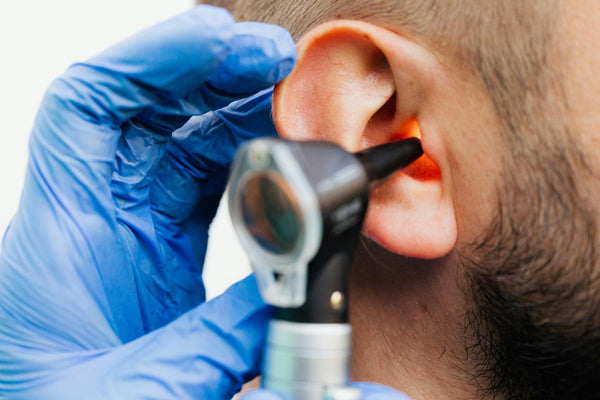
Ear pain, or earache, is a common problem that can affect anyone at any age. It can be sharp, dull, constant, or come and go - sometimes linked to infections, ear wax build-up, or even sinus or jaw issues. While it’s often temporary, persistent or severe pain should always be checked by a professional.
At Leightons, our audiologists and hearing care experts are here to help you understand what’s causing your discomfort and provide safe, effective treatment to help you feel better.
What causes ear pain?
Ear pain can arise from many different parts of the ear. The outer ear (the visible part and ear canal) is most often affected by irritation, infection, or trapped water. The middle ear, located behind the eardrum, can become inflamed during infections or pressure changes. Sometimes, ear pain isn’t caused by the ear itself but by nearby areas like the jaw, throat, or sinuses.
Common causes of ear pain
Several conditions can lead to ear discomfort, including:
- Ear infection (otitis media or externa): The most common cause of ear pain, often resulting from bacteria or viruses.
- Ear wax build-up: A blockage of hardened wax can cause pressure or aching.
- Eustachian tube dysfunction: When the tube connecting the ear to the throat becomes blocked, it can create pressure and pain.
- Jaw or sinus problems: Pain can sometimes radiate from nearby areas, such as a dental issue or sinus congestion.
- Perforated eardrum: A small tear can cause sharp pain followed by temporary hearing loss.
- Pressure changes: Rapid altitude changes, like during flights or diving, can lead to temporary discomfort.
Related symptoms
Ear pain can appear with other symptoms, such as:
- A feeling of fullness or pressure in the ear
- Temporary hearing loss
- Fluid or discharge from the ear
- Ringing or popping sensations
- Itching or swelling
- Fever or dizziness (in more serious cases)
If pain lasts longer than a few days or comes with other worrying signs, it’s time to see a professional.
When to see a professional
You should contact an audiologist or GP if:
- Ear pain is severe or persistent
- There is fluid, pus, or blood coming from the ear
- You experience hearing loss or balance issues
- Pain occurs after a cold, sinus infection, or flight
- You have a fever or dizziness
Leightons’ audiologists can safely assess your ear using specialist equipment to find the cause and guide you on the best next steps.
Diagnosing ear pain
During an ear health check or hearing assessment, your audiologist will examine your ear canal and eardrum to identify signs of infection, wax build-up, or injury. They may recommend a hearing test if pain is linked to blocked hearing or fluid build-up. This gentle, non-invasive process helps pinpoint the problem so treatment can begin quickly and safely.
Treatment and relief options
The right treatment depends on the cause of your ear pain. Common approaches include:
- Pain relief: Over-the-counter medication can ease mild discomfort.
- Warm compresses: Applying gentle heat to the area may help soothe pressure.
- Professional ear cleaning: Safe removal of wax or trapped water can relieve pain.
- Antibiotic drops or medication: For bacterial infections.
- Avoiding water exposure: Keeping the ear dry helps during recovery.
Your audiologist can also offer personalised advice to prevent further irritation and support healthy hearing.
Preventing ear pain
You can lower the risk of ear pain by following these simple tips:
- Avoid inserting cotton buds or objects into your ears
- Dry your ears gently after swimming or bathing
- Manage allergies or sinus issues early
- Use ear protection in noisy environments
- Attend regular ear health checks if you’re prone to infections or wax build-up
Book a free hearing assessment
If you’re experiencing ear pain or discomfort, don’t wait for it to worsen. Our team of experienced audiologists can examine your ears, identify the cause, and offer gentle, effective solutions.
Book your free hearing assessment and take the first step towards clearer, more comfortable hearing.








